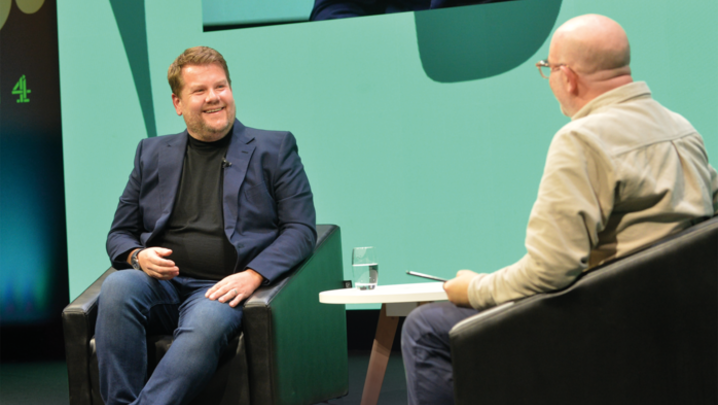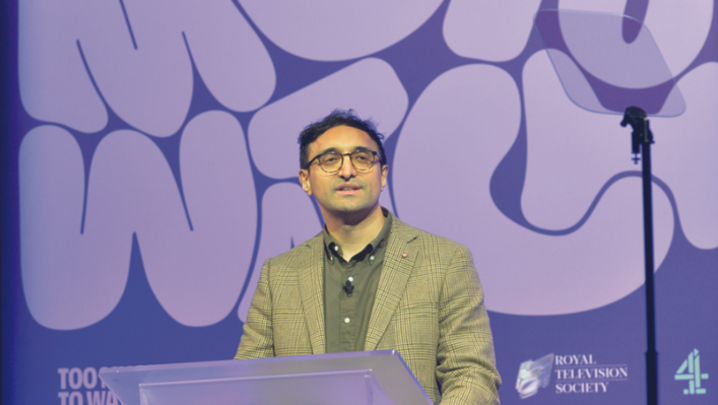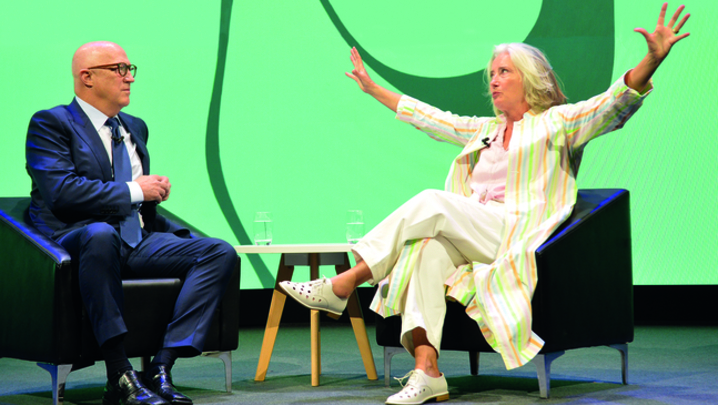Peter Bazalgette looks back on a year of cliff-hanging drama.
JANUARY
The year begins and ends with Brexit, or “breakfast” as one confused supporter dubs it on TV. James Graham, the gifted chronicler of our times, creates The Uncivil War for Channel 4 and HBO. Graham perfectly captures how this febrile issue divides our nation by wealth, age and geography.
I’ve always thought it interesting that folk on the right tend to regard those on the left as misguided, whereas left-wingers regard right-wingers as immoral. The dichotomy is just as stark over Brexit. Brexiteers tend to see Remainers as a bit stick-in-the-mud, but Remainers think Brexiteers are reckless to the point of insanity.
Graham writes Shakespearian drama, in the sense that he reflects all shades of humanity without being simplistically judgemental in this way. A great quality.
ITV unveils its vegetable promotion campaign: “Eat them to defeat them.” Just what a PSB should be doing. But the claimed 17 million portions sold sounds like an awful lot of sprouts.
FEBRUARY
It’s finally confirmed that BritBox will launch in 2019, with the BBC and ITV as the founder partners. The commentariat goes into overdrive about “this competitor to Netflix and Amazon Prime”.
This surprises me because, the last time I looked, we weren’t thinking of creating a debt-funded behemoth with hundreds of millions of subscriptions worldwide. The market research I’ve seen shows an opportunity for one SVoD service in each country powered by indigenous media brands, as a niche competitor to the worldwide operators. Households will have, on average, two to four of these services, each costing less than a tenner a month. There’s clearly room for “the best of British content” in that mix.
I note that Sky now offers Netflix, and thus sees a future for itself as an aggregator of subscription services. Likewise, BritBox in the US sells many subs via the Amazon platform. And ITV’s blockbuster drama for TNT in the US, Snowpiercer, is co-funded by Netflix. Could it be that we’re becoming the best of frenemies?
MARCH
Unexpectedly, I get more unadulterated pleasure from Harry’s Heroes: The Full English than any other show this year. Yes, England’s old timers beat a team of German football veterans in the finale.
Yes, gaffer Harry Redknapp is almost overcome when Robbie Fowler scores twice. Yes, we see a lot of middle-age spreads diminish as the physical fitness message goes home. But the game’s final goal is redemptively scored by Paul Merson.
The most memorable part of the series was seeing him fishing on a river bank and reflecting on the nature of addiction. This chimes perfectly with the focus this year on mental health.
APRIL
A very significant announcement from my colleagues at ITV this month: a licensing agreement with Amobee (the global ad tech company now owned by Singtel).
In simple terms, this allows ITV Sales to offer brands and media buyers the ability to programmatically buy targeted impacts via our rapidly growing online platform, ITV Hub.
We still have the advantage of the largest simultaneous mass audience in the UK, but this adds new, critical functionality – something that is second nature to Facebook and Google.
In its 65-year history, ITV has done well with broad demographics and geographies, but this is a new era and a departure in corporate culture. Now, we need to have a relationship with each individual viewer/customer.
And things are hotting up all round: the new, worldwide rival to Netflix/Amazon, Disney+, is revealed. As a group, its profits will go down, but I note its share price goes up.
MAY
What a revelation Chernobyl is. Funded by Sky and HBO, from the Jane Featherstone production stable, it makes no compromises in casting to deliver some breathtaking storytelling.
An additional bonus for me is that it gives a major sales boost to the 2018 winner of the Baillie Gifford Prize for Non-Fiction: Chernobyl, History of a Tragedy by Serhii Plokhy. I call it a bonus because I chair the prize’s board.
As well as the superb series, check out the book – both are hair-raising accounts of a society built on lies.
In this month, ITV ends The Jeremy Kyle Show after the death of a guest and introduces refreshed processes to support the wellbeing of programme participants.
We knew how important this was when I first produced Big Brother in 2000. But the big differentiators since then have been the novel pressure of social media coupled with a greater understanding of mental-health issues.
JUNE
The BBC announces that it will restrict free television licences for the over-75s. From June 2020, it intends to link the concession to the much smaller cohort who receive pension credit. In round terms, this will cut the cost to the licence fee from £750m to £250m.
Whatever dissembling politicians say now, this was exactly the latitude the government gave Auntie at the time of the last Charter renewal – or shotgun marriage, as some see it.
There are, of course, other ways. Our next government could start paying for this scheme again. Alternatively, it could row back generally on the assistance the baby boomers tend to receive at the expense of still-working generations. But, either way, why not leave the licence fee for programmes?
It is revealed that Sharon White will leave Ofcom for John Lewis. Great for her but a big loss for our industry. I lead a board simulation exercise for talented executives which Sharon takes part in. She grills me intensely on aspects of chairing. The day after, I find out why. Never knowingly undersold…
JULY
A bonanza month for sport. The BBC gets 11 million viewers for the Women’s World Cup semi-final between England and the US. But, like ITV’s Rugby World Cup final later in the year, the wrong result.
Then comes an epic Sunday on our screens: the Wimbledon Men’s Final, the British Grand Prix and England vs New Zealand in the Cricket World Cup (with, apparently, the Women’s Netball World Cup also on).
Mass audiences all round. But the cricket provides the most bizarre climax after a tie and a surreal extra over. It rivals an alleged entry in a score book in southern India: a lusty batsman drove the ball out of the ground and into the adjacent bay, where an opportunistic shark swallowed it – “bowled Patel, caught shark”. Call me Baron Munchausen, if you like…
AUGUST
Ofcom publishes its second “Media Nations” report, reviewing key trends in TV and online video. More than half of TV households now have their set connected to the internet. Eight out of 10 adults have a smartphone. And around half of homes have at least one VoD subscription.
A great time to be a viewer and an unprecedentedly propitious time to be a storyteller, provided you get your model right. People still watched an average of 3.2 hours of broadcast TV a day, but this was 11 minutes down on the previous year and 49 minutes down on 2012. This decline is, of course, steeper with younger viewers.
As we swiftly change our models, there’s still an important role for the PSBs to deliver universally available, scaled services with programmes that must demonstrate a public purpose.
It’s gratifying for the BBC to have Ofcom’s report recognise the finales to Bodyguard and Line of Duty as enduring examples of mass appeal. Gratifying, also, for World Productions, part of ITV Studios, which makes both series.
SEPTEMBER
To Cambridge for our industry’s biennial health check and workout, courtesy of the RTS. Here are some Cantab-bytes: “We ordered our diversity pizza ages ago, it’s time to deliver” (Lenny Henry). And speaking of access: “You’re never going to make it in TV. Your accent is appalling” (Lorraine Kelly).
Turning to modern viewing habits: “I go on trains and buses at 3:00pm to see what schoolchildren are doing” (Paul Bojarski); and “[the BBC will be] the best people to tell the stories of the UK to the world… with a distinctive set of British values” (Tony Hall).
The streaming competition: “Sometimes, you do your best work when challenged” (Reed Hastings); and “Holy shit – we’re in trouble. What do the other seven guys have? Go get it. I don’t care what you have to pay” (David Zaslav).
Finally, the value of broadcasting: “In an era of fake news… public service news has never been more important to our democracy” (Carolyn McCall, conference chair); and “Our society is getting more polarised and more tribal, [TV] can bring us together” (Nicky Morgan MP).
OCTOBER
I’m invited to speak in the City with BT, which is launching its “Beyond limits” campaign to tackle digital exclusion. I ask John Whiston, ITV’s soap consigliere, whether Corrie or Emmerdale have had any recent storylines about society’s struggles with the internet era that I can share.
I’m not disappointed, as they always have their finger on the nation’s pulse. Jenny, the current Rover’s Return landlady, reconnected with the Street via Facebook; there’s been a coercive relationship where bullying Geoff changed all Yasmeen’s passwords; and, over the Pennines, Ryan has created an online platform to help sell Matty’s restored furniture.
Truly, Britain’s soap operas are the essence of our national conversation.
NOVEMBER
Mid-month, Creative Careers Week has 500 employers across our sector opening their doors to thousands of young people to learn about the many rewarding career paths on offer. It’s one of many initiatives we recommended to government in order to grow the creative industries beyond their present £101bn value (more than 5% of the economy).
Having had our proposals endorsed by the current industrial strategy, there are now investments in nine “creative clusters” around Britain and further backing for immersive tech (virtual reality to you and me).
There’s also a new sort of export board being set up as a joint venture with the Department for International Trade. We’ve finally got the creative industries on the national map. And, if you’ve seen the extraordinary growth figures for TV and film production, you’ll know this is not before time.
DECEMBER
And so, as indicated, the year ends with the Brexit general election. Television is playing a more central part in the campaign than ever. Some great reporting on all the news programmes, taking the temperature of our nation as never before. And a plethora of debate and interview shows, to which all the leaders submit themselves at some point.
But lest we get carried away in a lather of self-congratulation, what’s this? A block of ice in place of a politician… really? A three-minute piece to camera about trust… really? I recall being taught as a BBC news trainee (42 years ago, I confess) to report the story, not be the story.
And with that, a happy 2020 to all our readers.
Sir Peter Bazalgette is Chair of ITV.







